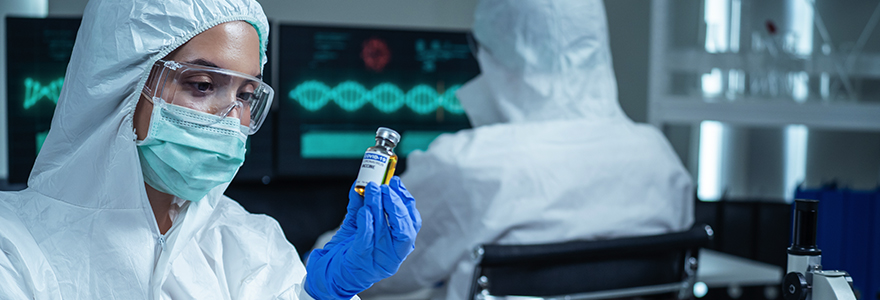Western researchers join the call for rational discourse to protect vital virus research
 Virology research has not only led to the development of vaccines and antiviral drugs but has also contributed to progress in other fields, such as cancer and cardiac health.
Virology research has not only led to the development of vaccines and antiviral drugs but has also contributed to progress in other fields, such as cancer and cardiac health.
By Prabhjot Sohal
The COVID-19 pandemic revealed the power of scientific innovation in times of crisis. Years of prior research on viruses enabled decisive action with the swift development of vaccines and antiviral drugs. However, virology researchers say vital virus research that helped mitigate the pandemic's impact is now under ill-informed scrutiny and may hinder efforts to prepare humanity for future health threats.
More than 150 virology experts, including Schulich School of Medicine & Dentistry professors Jimmy Dikeakos and Miguel Quinones-Mateu, have published a commentary in the American Society for Microbiology (ASM) journals mSphere, mBio and the Journal of Virology, calling on policymakers to recognize the importance of evidence-based discussions on critical pathogen research.
“It is critical to continue to study virology within basic research laboratories to enable our pandemic preparedness initiatives,” said Dikeakos, professor in the department microbiology and immunology at Schulich Medicine & Dentistry. Virology research provides essential knowledge and insights that are crucial for developing effective strategies to prevent and control pandemics.
“Uninterrupted and watchful scientific research is needed to be ready for the next viral pandemic,” said Quiñones-Mateu, who is Western Research Chair in viral pathogenesis and professor in the department of pathology and laboratory medicine at Schulich Medicine & Dentistry.
The commentary centres on research related to enhanced potential pandemic pathogens (ePPP) and dual-use research of concern (DURC), also called ‘gain-of-function’ or ‘loss-of-function’ research. This kind of research involves routine virological techniques to achieve a desired function, like improved vaccine yields, while sometimes also resulting in a loss of function, such as diminished viral replication capabilities. The objectives of such research are to better understand the virus's potential to cause illness, its modes of transmission and the development of possible countermeasures.
“To respond rapidly to emerging viral threats, we must be able to apply modern biology tools to ensure that we are prepared to respond to and reduce the burden of future disease outbreaks,” said Felicia Goodrum, co-editor-in-chief of the Journal of Virology.
Scientists have not only used these techniques to develop vaccines and antiviral drugs, but have also made significant advancements in other areas, including the development of melanoma therapy and antitumor treatment. Even the repair of cardiac pacemakers has been made possible through gain-of-function virus research.
The commentary underscores DURC is carried out safely, under strict biosafety and biosecurity protocols. In Canada, the safety protocols and oversight of DURC are robust, with multiple levels of regulatory and institutional controls in place. The Public Health Agency of Canada (PHAC) and the Canadian Food Inspection Agency (CFIA) oversee and regulate the use, handling and disposal of human and terrestrial animal pathogens. The Canadian Biosafety Standard (CBS) provides guidelines and requirements for laboratories working with pathogens and research institutions are required to establish Institutional Biosafety Committees (IBCs) responsible for ensuring compliance with national biosafety standards and guidelines.
The authors of the commentary acknowledge the ongoing debate around this research is partially driven by the theory that the SARS-CoV-2 pandemic originated from a lab leak. However, they assert that an abundance of evidence supports a zoonotic origin for the virus, which means the virus developed through transmission between wild animals and humans.
“Research on dangerous pathogens does require oversight, but we must be careful to not overly restrict the ability of scientists to generate the knowledge needed to protect ourselves from these pathogens,” said Michael Imperiale, professor of microbiology and immunology at the University of Michigan Medical School and editor-in-chief of mSphere journal.








